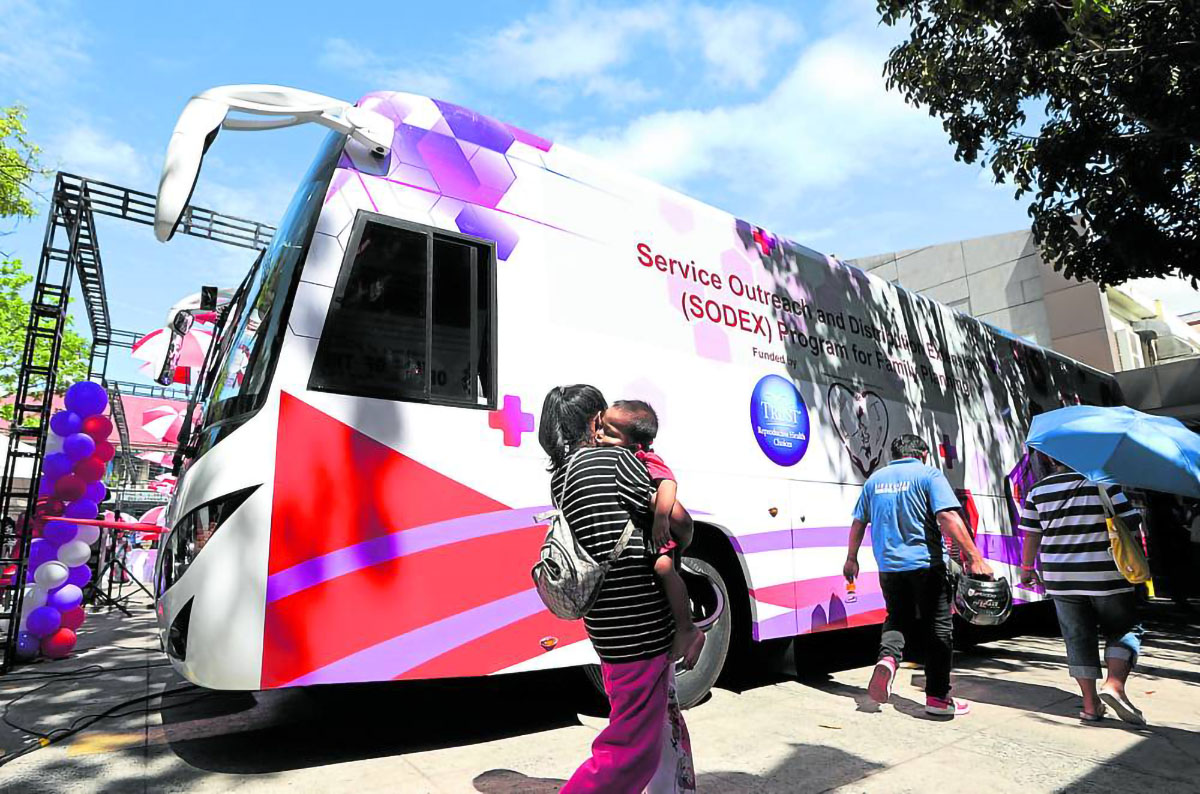
FIRST STOP The Sodex mobile clinic is formally launched on Wednesday in Binangonan, Rizal, hoping to extend access to safe and affordable family planning methods and services in the poorest communities across the nation. Sodex stands for the Service Outreach Distribution Extension Program, a project of the nonprofit DKT Philippines Foundation. PHOTO BY NIÑO JESUS ORBETA
MANILA, Philippines — There’s that thing about the birds and the bees — and then there’s this bus.
A mobile clinic for family planning services was officially launched on Wednesday, hoping to reach areas where couples may need help to access safe and modern contraceptives and birth control procedures.
A bus has been repurposed — its interior modified to set up areas for patient screening, consultation and surgery — under the Service Outreach and Distribution Extension Program (Sodex) of the nonprofit DKT Philippines Foundation.
Aside from being a distributor of free contraceptive pills, condoms, injectables and intrauterine devices (IUD), the mobile clinic is equipped and staffed to perform bilateral tubal ligation on women and nonscalpel vasectomy on men.
Affordable, safe options
The medical team onboard is led by Dr. Luis Garcia Jr., who is a surgeon, and also includes a nurse, a midwife and a third staff member.
“DKT Philippines Foundation’s mission is to provide couples with affordable and safe options for family planning and HIV/AIDS prevention through dynamic social marketing,” said Loida Almendares, the foundation’s programs director, during the Sodex bus launch at Barangay Calumpang, Binangonan, Rizal province.
“The Sodex mobile clinic will provide a wide array of free family planning services especially in areas with lesser access to services like the geographically isolated or socially disadvantaged areas. The mobile clinic will bring the services closer to the people and meet them where they are,” Almendares added.
“DKT Philippines Foundation and its Family Planning Mobile Clinic reinforce DKT’s commitment to ensuring nobody is left behind and provides free and quality reproductive health options, including permanent methods, to those most remote and vulnerable communities,” said Denise van Dijk, board chair of DKT Philippines Foundation.
Tale of 2 mothers
The Sodex bus hopes to be of help to the likes of Mylyn Figuracion and Ronalyn Luis, who traveled for an hour and a half by boat and jeepney from their homes on Talim Island in the middle of Laguna de Bay, to hopefully avail of its services.
Both women are already mothers to four sons and are wishing for a baby girl next time they get pregnant.
But as the 44-year-old Figuracion put it, she and her husband still have many young mouths to feed and ‘’I don’t even know if my body at this age can still bear a child.’’
Luis, on the other hand, said she still wanted to have a daughter but “definitely” not in the near future.
According to the women, their barangay has been handing out pills for free. But there were “side effects” for Figuracion like headaches, chest pains and hardness of breathing. Their husbands are also not comfortable using condoms.
It was only in early 2016 when they were introduced to birth control implants. In August that year, however, the Supreme Court issued a temporary restraining order (TRO) against their distribution.
The high court would eventually lift the TRO after the Food and Drug Administration declared the implants to be nonabortifacient, or else it would be banned under the reproductive health law.
According to Figuracion, she got pregnant with her fourth child during the period when no implants were available in the barangay.
Next stops
It is precisely for parents with such experiences and concerns that the Sodex bus also provides counseling services. For the next 119 days, the roving clinic will approach individual local governments to cover all the regions of Luzon and stay in a particular area for a day or two.
From Binangonan, its next immediate stops are the cities of San Pablo and San Pedro in neighboring Laguna province. Next year’s itinerary will take the bus to the Visayas and Mindanao.
Attending Wednesday’s launch on behalf of the Department of Health (DOH), Undersecretary Glenn Mathew Baggao thanked DKT Philippines Foundation for coming up with the Sodex program, saying it could help the DOH achieve its goals especially under the responsible parenthood and reproductive health law.